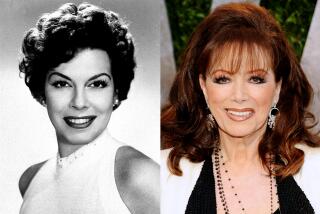Pop Culture’s Males Falling Hard for the Clumsily Cute
- Share via
Am I the only moviegoer in America who feels just the teeniest bit sorry for Natasha?
Natasha is the girlfriend of Mark Darcy in the hit movie “Bridget Jones’s Diary”--until, of course, Darcy inevitably succumbs to the rough charms of the title character. The deck is stacked; the fix is in. Natasha has no chance of hanging onto Darcy. She may be beautiful, accomplished and intelligent, but she suffers from a flaw that is absolutely fatal in the contemporary woman:
She’s not wacky.
She does not run from her apartment in the middle of winter clad only in her underwear; she does not concoct amusingly disastrous meals. No, Natasha is steady and smart. And not for a single instant is there the slightest possibility that Natasha will prevail against the funky, fumbling, bumbling, clueless and putatively adorable Bridget.
For women, the 21st century archetype--manifested by characters in film, TV and novels--seems to be the crazy lady, the dizzy dame, the goofy gal, the lovable lunatic, the sprite, the gamin. The ghost of Lucy Ricardo--oh, no-o-o-o-o, look what she’s gone and done this time!--stalks the entertainment world like Hamlet’s old man, only instead of being stern and mysterious, she’s ditsy and giggly.
If you happen to believe, as I do, that images in popular culture are as important to keep an eye on as radiation levels in a nuclear power plant, then we’re in trouble. Just a few short years ago, a diversity of acceptable behaviors for women seemed in effect; now, the feminine ideal has been progressively winnowed down to one: wackiness.
In the ABC sitcom “What About Joan,” Joan Cusack’s character is a wiggling bundle of tics, jerks and lurches. She misspeaks, missteps, misunderstands and messes up everything, but it’s all just so completely and inescapably irresistible, isn’t it? I mean, you just want to pat her confused little head and murmur, “It’s OK, Joan, we can always get another couch!”--or car or cat or stewpot or garage, after one of her escapades has ruined one or all of the above.
Cusack is merely the latest member of the gang of wacky gals, from the female leads in “Friends,” “Dharma & Greg” and “Will & Grace”--look out with the Frisbee, that’s a priceless Ming vase!--to characters portrayed in movies by the likes of Julia Roberts and Sandra Bullock. They get into funny scrapes through inattention or incompetence, then get out of those sticky wickets through charm and cheekbones.
I was hoping to have my theory refuted in the pages of “Paradise Park,” the acclaimed new novel by Allegra Goodman that chronicles a young woman’s search for meaning in her life. The narrator, Sharon Spiegelman, is the latest in a long line of spiritual seekers in literature, such as Laurence Darrell in W. Somerset Maugham’s 1944 novel “The Razor’s Edge.” But there’s a crucial difference: Again and again, just when Sharon approaches an epiphany, the author cuts her legs out from under her with a wisecrack.
In “The Razor’s Edge,” there are dozens of places at which Maugham could have similarly undermined Darrell’s mission with a cheap put-down, but he resisted.
This disturbing new image for women valorizes only the pratfall, reducing female ambitions to kooky, harebrained schemes. Some women, to be sure, are clumsy and loud and endearing. But some are graceful. Some are shy.
Between the racket of crashing dishes--whoops, look out!--and the flash of a cutie-pie dimple, women are being wedged into a stereotype as confining as a pair of too-tight shoes: the wacky gal. You can take her out on the town or take her to bed, but you can’t take her seriously.
More to Read
Only good movies
Get the Indie Focus newsletter, Mark Olsen's weekly guide to the world of cinema.
You may occasionally receive promotional content from the Los Angeles Times.










